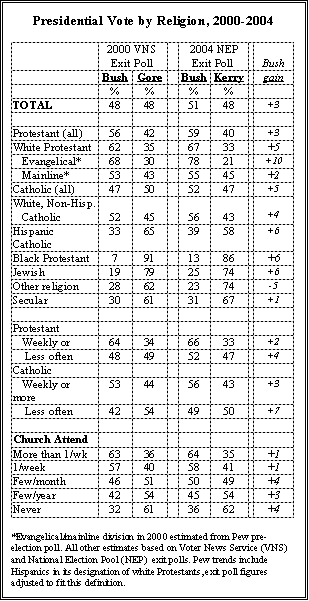 President Bush’s successful reelection effort owed much to the support he received from highly religious voters, especially white evangelical Protestants. But what has been largely overlooked is Bush’s success with less religious voters. In fact, compared with four years ago, Bush made relatively bigger gains among infrequent churchgoers than he did among religiously observant voters.
President Bush’s successful reelection effort owed much to the support he received from highly religious voters, especially white evangelical Protestants. But what has been largely overlooked is Bush’s success with less religious voters. In fact, compared with four years ago, Bush made relatively bigger gains among infrequent churchgoers than he did among religiously observant voters.
Voters who say they attend church at least once a week backed Bush at the same high rates as in 2000. But he made inroads among those who seldom if ever attend religious services, although John Kerry maintained a sizable advantage among these voters.
Trends in the religious vote in this election defied the conventional wisdom in other ways as well. Bush’s support among white evangelical Protestants, already quite substantial, increased markedly from its 2000 level. However, there is no evidence that evangelicals comprised a larger share of the vote this year.
Moreover, while Bush drew more support from evangelicals, he increased his share of the vote among other religious denominations as well. Bush fared better among Jews and Catholics especially Catholics who do not attend church frequently than he did in 2000.
Bush Gained Among Evangelicals
According to the National Election Pool exit poll, Bush received 78% of the vote among white evangelicals, up 10% from 2000, according to Pew’s final pre-election poll that year. (The 2004 exit poll cannot be directly compared with the exit poll in 2000, which did not include a measure of evangelical identification).
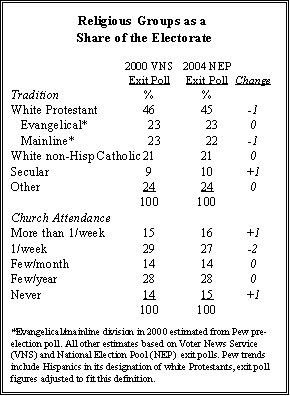 Although voter turnout was up generally in 2004, there is no indication that white evangelicals boosted their level of participation more than other groups in the population. According to a comparison of exit polls and Pew surveys in 2000 and 2004, white evangelicals constituted the same percentage of the electorate in both years: 23%. Overall, there was remarkable stability from 2000 to 2004 in the religious composition of the electorate. The size of other religious groups, and the balance of frequent churchgoers and those who attend infrequently was nearly identical in the two election years.
Although voter turnout was up generally in 2004, there is no indication that white evangelicals boosted their level of participation more than other groups in the population. According to a comparison of exit polls and Pew surveys in 2000 and 2004, white evangelicals constituted the same percentage of the electorate in both years: 23%. Overall, there was remarkable stability from 2000 to 2004 in the religious composition of the electorate. The size of other religious groups, and the balance of frequent churchgoers and those who attend infrequently was nearly identical in the two election years.
Still, the election underscored the importance of white evangelical voters to the GOP. In 2004, they constituted 36% of Bush voters. By comparison, African-Americans the most loyal of Democratic constituencies constituted only about one-fifth (21%) of Kerry’s voters.
But Others As Well
President Bush increased his share of the Catholic vote by five percentage points (52% in 2004, vs. 47% in 2000). His gain among white, non-Hispanic Catholics was four points (52% to 56%).
But the similar size of Bush’s gains among Catholics and his gains among other groups suggest that the impact of conservative bishops who spoke out against John Kerry was relatively limited. During the campaign, several Roman Catholic bishops vowed to deny Communion to lawmakers who support abortion rights. But voter support for Bush increased slightly less (three points) among Catholics who are regular churchgoers, and thus who might be more apt to hear about and be influenced by the bishops’ appeal, than among those who attend less frequently (up seven points). Indeed, a Pew poll in August found widespread disapproval of the bishops’ action among Catholics, with 72% of Catholics saying that it was inappropriate.
Bush also registered a larger-than-average gain among Jews, winning 25% of the vote up from 19% in 2000. In the key swing state of Florida, he received 20% of the Jewish vote, up from 12% four years ago.
Kerry registered significant gains relative to Al Gore’s performance among two groups: seculars and those who do not identify with the major Christian or Jewish traditions. Kerry received 74% of the vote among those who identify themselves as something other than Christian or Jewish, up by 12 points from Gore’s total in 2000. And 67% of seculars voted for Kerry, compared with 61% who voted for Gore. Bush’s share among the seculars was about the same in 2000 and 2004, but in 2000 7% of seculars voted for Nader. This year only 1% did so.
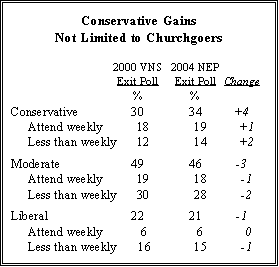 Conservative Turnout Rises
Conservative Turnout Rises
The electorate of 2004 was more Republican and conservative than the electorate of 2000, with Republicans matching Democrats 37%-37% this year (compared with 39% Democrat, 35% Republican in 2000), and the percentage of self-identified conservatives rising four points (from 30% to 34%).
Conservative gains were about the same among less frequent churchgoers (up 2%) as among those who attend church at least once a week (up 1%). Similarly, turnout among Republicans who do not attend church weekly was up at least as much as among those who go less often.
Evangelicals Trend More Republican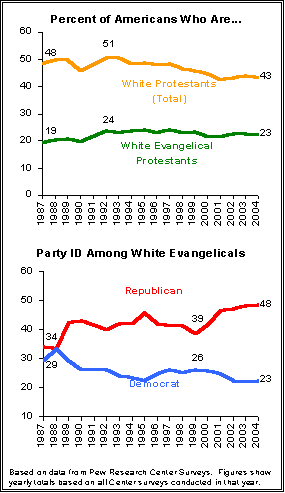 The rising political clout of evangelical Christians is not the result of growth in their numbers but rather their increasing cohesiveness as a key element of the Republican Party. The percentage of the population who are white evangelicals has changed very little (19% in 1987; 23% now) and what growth there was occurred in the late 1980s and early 1990s.
The rising political clout of evangelical Christians is not the result of growth in their numbers but rather their increasing cohesiveness as a key element of the Republican Party. The percentage of the population who are white evangelicals has changed very little (19% in 1987; 23% now) and what growth there was occurred in the late 1980s and early 1990s.
However, in 1987, white evangelical Protestants were divided in their partisan attachments, with 34% identifying as Republicans and 29% as Democrats. Today, Republicans outnumber Democrats within this group by more than two-to-one (48%-23%).
This shift toward Republican identification among white evangelicals came in two stages. In the late 1980s, white evangelicals in the South were still mostly wedded to the Democratic Party while evangelicals outside the South were more aligned with the GOP. But over the course of the next decade or so, the GOP made gains among white Southerners generally and evangelicals in particular virtually eliminating this regional disparity.
The second stage began in 2000, coinciding with Bush’s election. Since then, there has been rapid growth in Republican identification among both Southern and non-Southern evangelicals. Nationwide, Republican identification among white evangelicals increased from 39% in 1999 to 48% today. In 2004, white evangelicals made up 23% of the population, and 37% of the Republican Party.
Bush Voters: Faith Matters, Leadership Matters More
Bush voters placed much more emphasis on a candidate’s religious faith than did Kerry supporters. Among those who voted for Bush, 14% cited a candidate’s “strong religious faith” as the single most important quality in their vote; just 1% of Kerry supporters cited that as a major factor in their vote.
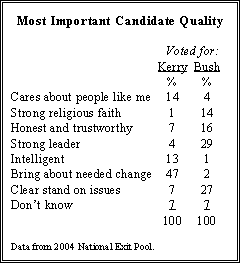 Nonetheless, significantly more of Bush’s supporters mentioned leadership (29%) and a clear stance on the issues (27%) as the candidate qualities that mattered most. In addition, a candidate’s honesty was mentioned about as often as personal faith as a major factor for Bush’s supporters.
Nonetheless, significantly more of Bush’s supporters mentioned leadership (29%) and a clear stance on the issues (27%) as the candidate qualities that mattered most. In addition, a candidate’s honesty was mentioned about as often as personal faith as a major factor for Bush’s supporters.
For Kerry supporters, by contrast, the desire for change trumped all other candidate qualities. Nearly half (47%) cited that as the most important factor; far fewer cited a candidate’s empathy (14%) and intelligence (13%) as the qualities that mattered most in their vote.
About the Analysis:
The data for this analysis are drawn from the 2000 VNS and 2004 NEP Exit Polls with one important exception. While the 2004 NEP Exit Poll included a measure of evangelical identification (“Would you describe yourself as a born-again or evangelical Christian?” [Yes, No]), the 2000 VNS Exit Poll did not include this question. As a result, trends are drawn from the Pew Research Center’s November 2000 election weekend survey of 1,677 likely voters conducted November 1-5, 2000, which has a margin of error of plus or minus 3 percentage points. Results of the 2004 Pew Research Center election weekend survey of likely voters are consistent with the 2004 NEP exit poll figures shown here for both the number of the evangelical Christian voting and the proportion voting for George W. Bush.


